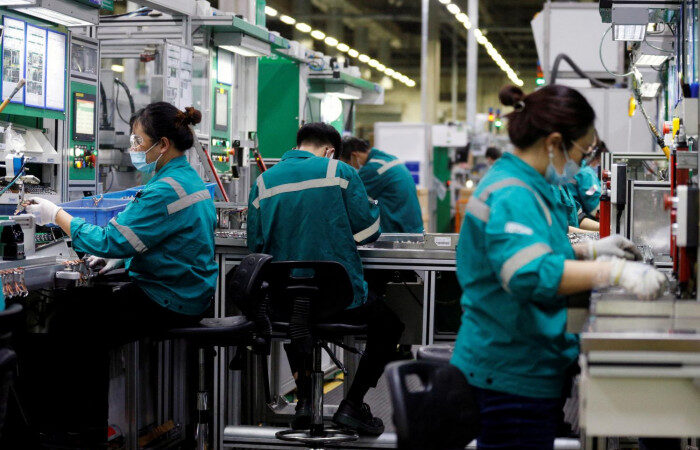
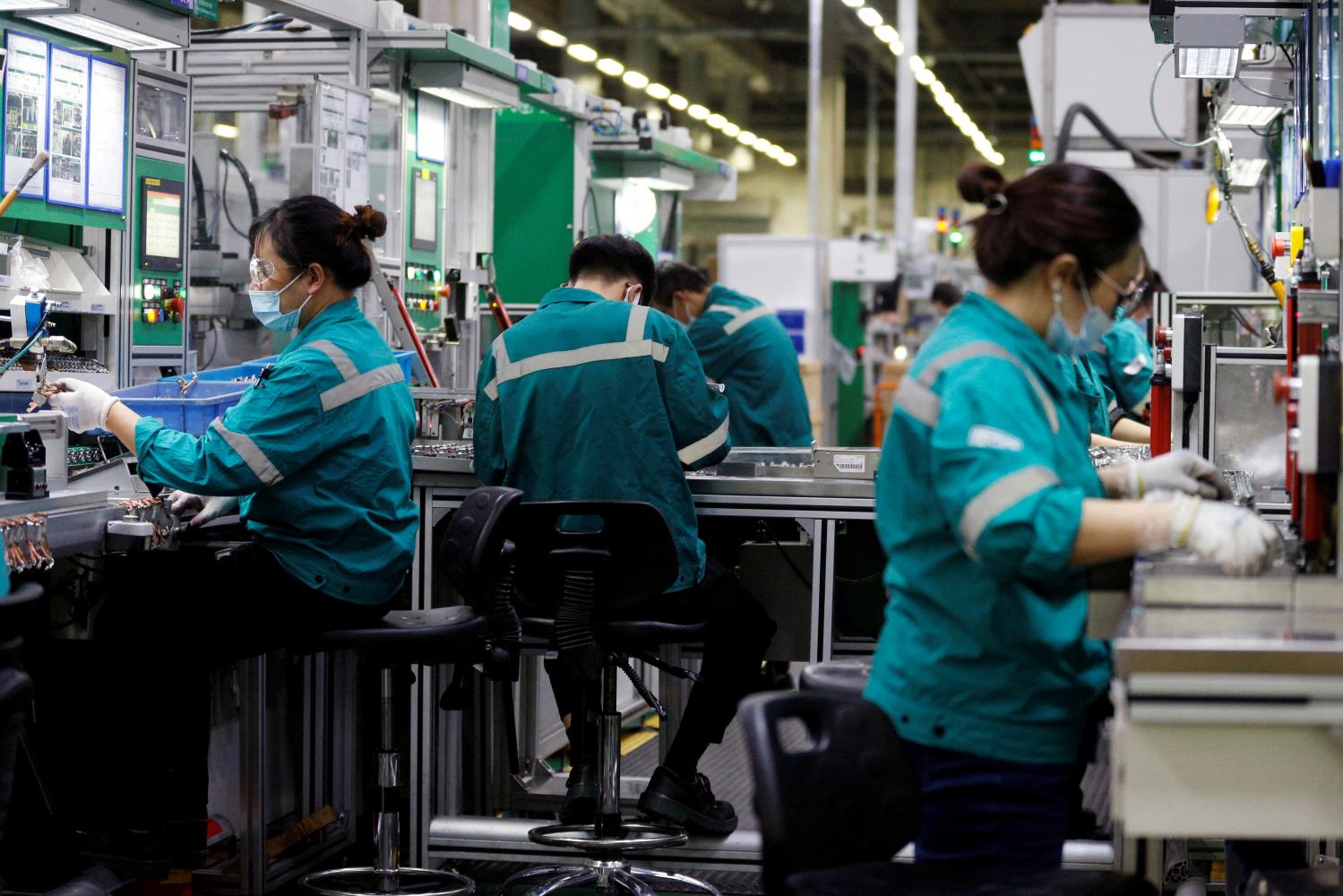
When China announced the country’s surprise reopening in January, every business sector in Thailand responded enthusiastically to the news, particularly the tourism industry, which earned more than 530 billion baht from Chinese visitors in 2019.
Since then, the feeble recovery of the mainland’s economy caused middle-income earners to face salary cuts, leading them to consider saving money instead of spending it on travel.
The Tourism Authority of Thailand (TAT) estimated 4 million Chinese visitors will generate 250 billion baht in revenue for Thai tourism this year. Gaining only 50% of the spending level from 2019 is considered a tremendous challenge as Thailand struggles to grow its economy.
Yuthasak Supasorn, TAT governor, said Chinese visitors’ spending per person this year might not be affected as there is demand to travel after being locked down for a few years, helping to drive independent tourists with high purchasing power.
If the average income of Chinese employees continues to dip through next year, he said the growth of this market in 2024 would not surge as forecast earlier.
Narongsak Putthapornmongkol, president of the Thai-Chinese Chamber of Commerce, said although workers in some professions may experience salary reductions, many jobs such as factory workers involved in maintenance, railways and electronics are receiving higher wages.
China recently created around 6.7 million jobs in urban areas and attracted more than 180 million people from rural areas to work in the cities, while Beijing is expected to maintain projected GDP growth of around 5% for the entire year.
With more Chinese businesses looking for opportunities abroad, Thailand has the potential to reap a windfall from relocation, said Mr Narongsak.
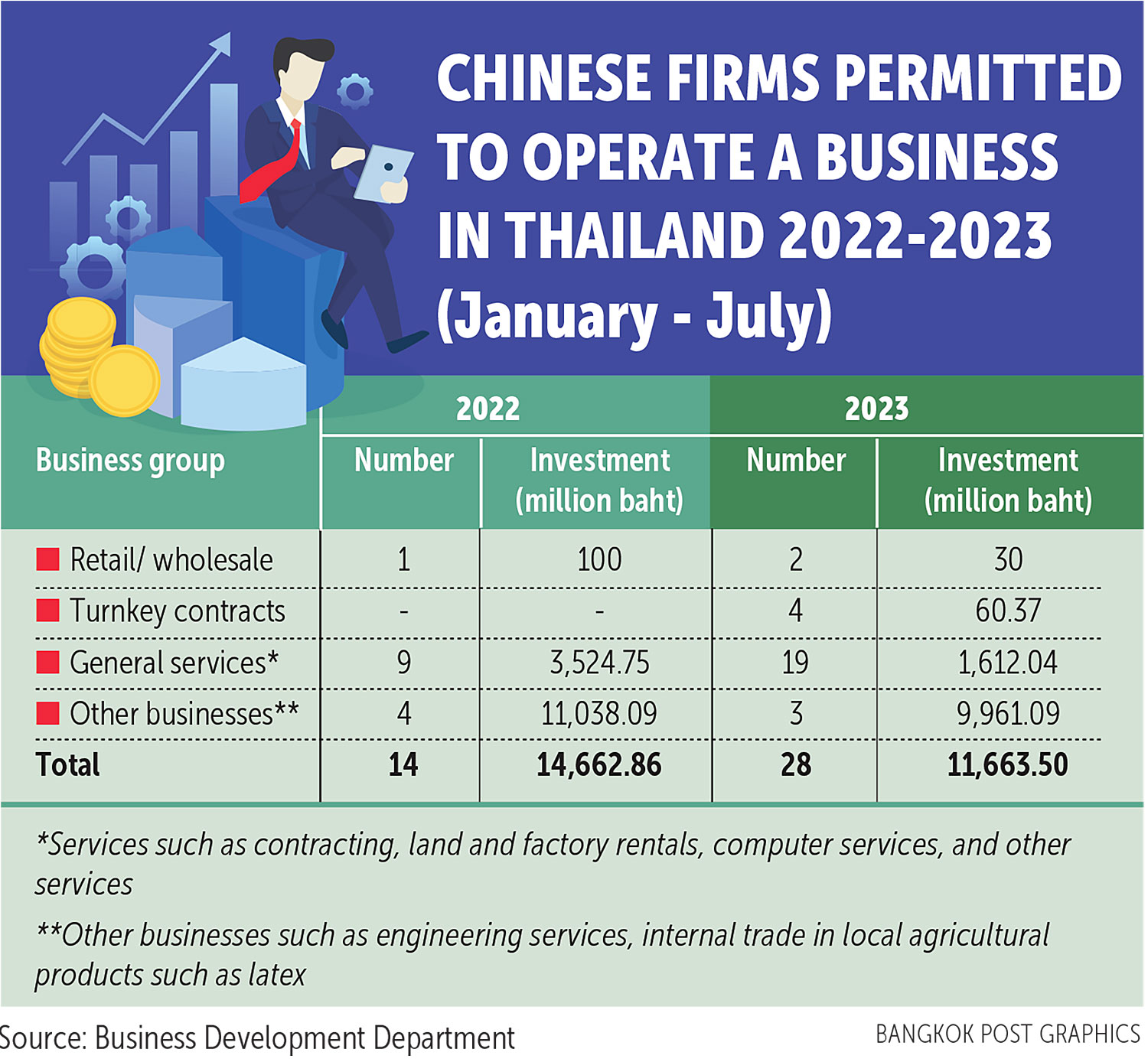
RELOCATION AND INVESTMENT
Though Chinese arrivals have not matched upbeat projections from earlier in the year, more wealthy Chinese are considering Thailand as a long-stay destination based on a surge of Thailand Elite Card sales to Chinese customers. This segment is anticipated to gain 5,000 new members this year and generate 5 billion baht, according to the company.
Manatase Annawat, president of Thailand Privilege Card, the operator of Thailand Elite Card, said the Chinese economic slowdown would not affect upscale tourists, who are the membership scheme’s key customers.
He said Chinese citizens were ranked among the world’s top markets among people who want to relocate abroad. Thailand is a preferred destination because of the short travel distance, quality of hospitality and range of attractions.
Unlike inbound tourism, which can be affected by the sluggish Chinese economy, investment from the mainland is expected to gather momentum as entrepreneurs are keen to expand their businesses overseas, including to Thailand, said the Federation of Thai Industries (FTI).
“Thailand is an investment destination for Chinese investors. We are still on China’s radar,” said Kriengkrai Thiennukul, chairman of the FTI.
China’s property sector is reeling, exports to the US declined and unemployment is rising for new graduates, all of which are causing people to spend less and travel domestically to save money, but in terms of investment, it is a different story.
A technology war between the US and China has not only dented trade, but also prompted businesses to relocate their production facilities overseas.
Using other countries as an export base should relieve Chinese entrepreneurs’ concerns over US trade barriers, said Mr Kriengkrai.
Many large tyre manufacturers from China decided to build factories in Thailand, while there is prominent investment from Chinese electric vehicle (EV) companies, he said.
Free trade between Beijing and Bangkok increases the export of Chinese products to Thailand, while the Thai government’s policy of promoting the local EV industry encourages Chinese EV makers to study manufacturing in Thailand, said Mr Kriengkrai.
Demand for EVs among Thai car buyers is also strong, helping to attract new EV investment projects from China, he said.
“Thailand always welcomes Chinese business people to invest here or make joint investments with local companies,” said Mr Kriengkrai.
Krithpaka Boonfueng, executive director of the National Innovation Agency (NIA), said Chinese investors will look for higher-growth investment markets such as Southeast Asia, including Thailand.
She said more Chinese venture capital investments in Thai startups related to health and sustainability are expected. The Chinese will look for support and investment that benefits both China and Thailand, said Ms Krithpaka.
The slowing Chinese economy offers an opportunity for Thai startups to expand into China, and this year the NIA will be pushing that tactic, she said.
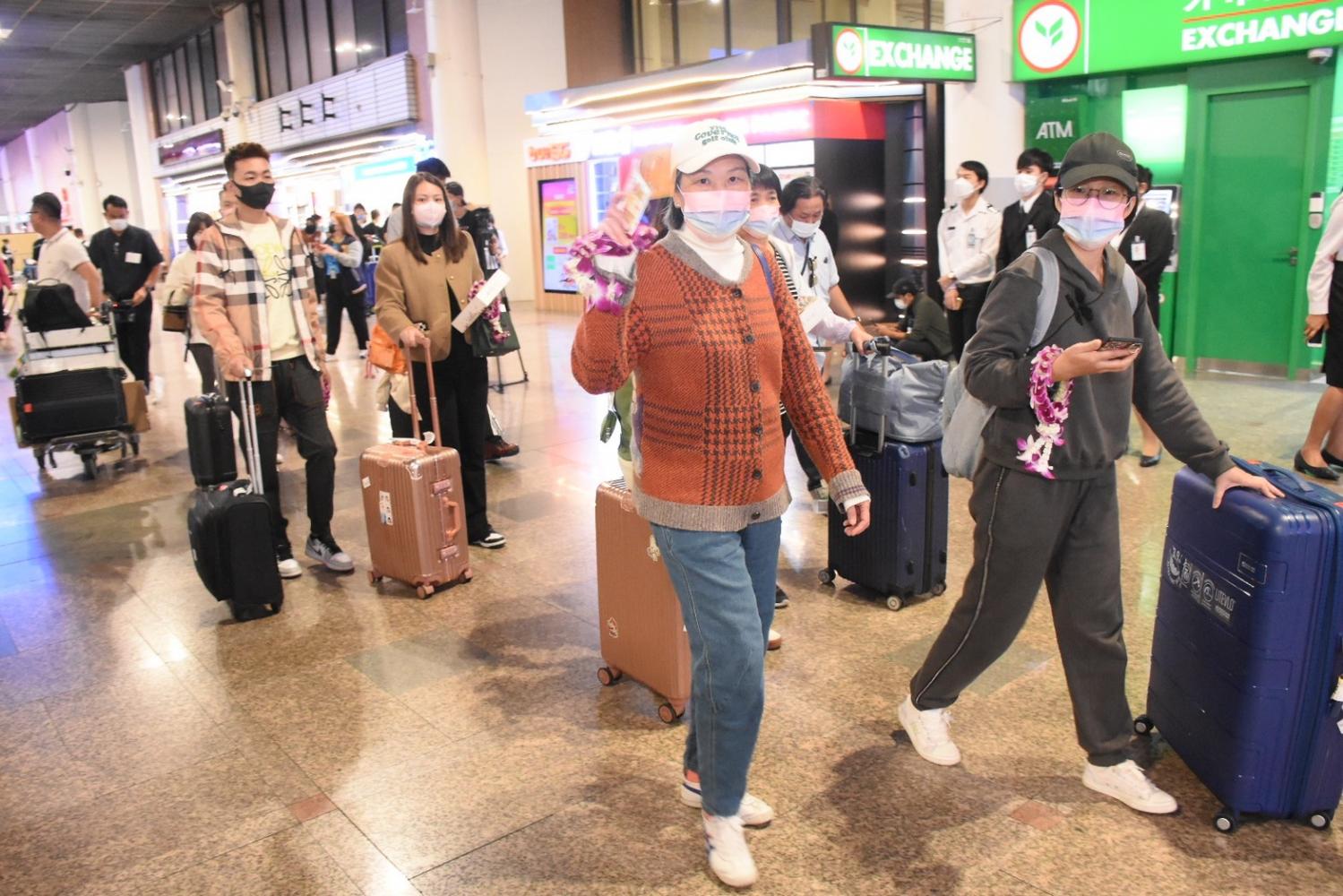
Chinese tourists visit Thailand following the reopening of China’s borders. The Tourism Authority of Thailand estimates 4 million Chinese visitors may generate 250 billion baht in tourism revenue this year.
ECONOMIC REPAIR
Sanan Angubolkul, chairman of the Thai Chamber of Commerce, said there have been signs the Chinese economy is decelerating, primarily because the government hastily reopened the country while domestic confidence was slow to recover.
In addition, the global economy slowed, which may affect China’s exports this year, he said.
China has focused on stimulating its domestic economy by investing in state infrastructure, encouraging private sector investments, and promoting economic activities to help circulate cash.
In recent weeks, the Chinese government promoted consumer spending on goods, offered incentives for the purchase of electrical appliances, organised regional activities and marketed offline events to pump up the economy.
Despite the economic downturn and salary cuts, Mr Sanan said he believes these new measures will contribute to China’s recovery in the latter half of this year.
Regarding tourism, he said the Thai-Chinese Chamber held talks with business leaders and investors engaged in trade and investment with China, finding that many Chinese still have a strong desire to travel abroad, but economic concerns and tense relations with Japan, South Korea and Taiwan are leading some to travel domestically or to countries in the region.
The Thai Chamber believes this presents a good opportunity for Thailand to attract Chinese tourists, said Mr Sanan.
However, a complicated visa application process and costly flights need to be addressed to lure this market, he said.
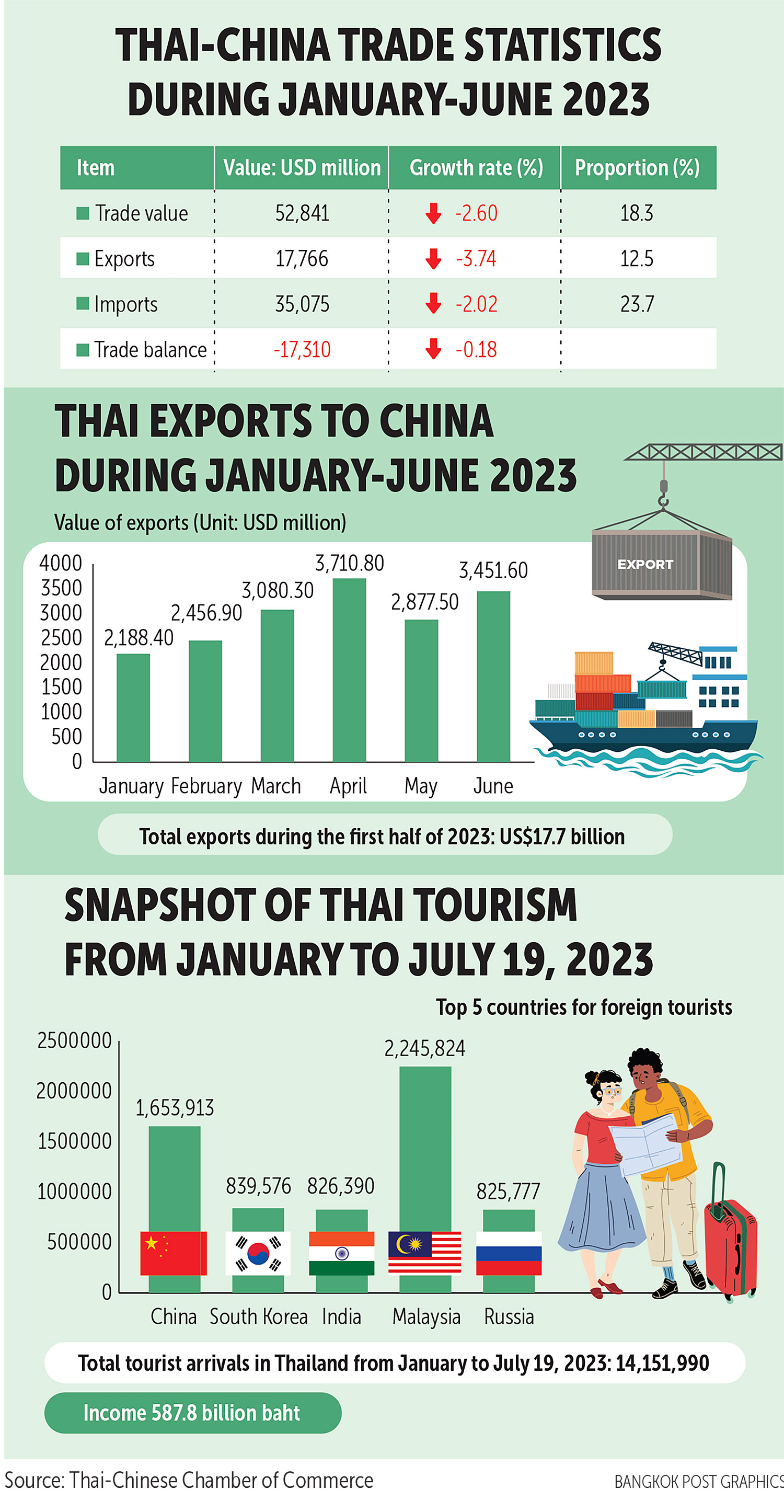
STIMULUS POLICY
Finnomena, a fintech startup investment brokerage, said foreign capital started flowing back into China last week after the Politburo Standing Committee announced it would stimulate the economy by using fiscal policy, which it has not done before.
Over the past two years, China mainly used monetary policy to deal with crises emanating from real estate, geopolitical conflicts and the pandemic.
At the beginning of 2022, China supported the economy through monetary policy, lowering the bank’s minimum reserve ratio and reducing interest rates.
Those measures disappointed investors and affected the economic recovery as well as the stock market, with the rebound slower than expected.
“It is not surprising the Chinese stock market has not recovered, although there have been positive factors such as the country reopening at the beginning of 2023,” the brokerage said in a research note.
The announcement of stimulus measures could be a turning point, covering real estate, domestic spending, and national and local government investment, said Finnomena.
“This is a return to stimulus through fiscal policy after being reticent. China has not stimulated the economy through such a policy so far, leaving huge room for recovery,” noted the brokerage.
“Foreign investors are starting to buy Chinese stocks again, in response to China’s commitment to implement economic stimulus policies. The Northbound Weekly Turnover reached its highest since 2021.”
Sompob Manarangsan, president of the Panyapiwat Institute of Management, said consumer spending might improve this year as the Chinese government attempts to stimulate the real estate sector by relaxing the criteria for second home purchases, such as by reducing down payments from 80% of a house’s value to 35%.
The government also reduced restrictions on labour mobility to let skilled workers move across provinces, which should help stimulate the economy, he said.
CAUTIOUS OUTLOOK
Pisit Puapan, director of the Bureau of Macroeconomic Policy at the Fiscal Policy Office, said the office initially expected 7.1 million Chinese tourists to visit Thailand this year, before reducing that projection to 5.5 million.
The dip in Chinese tourists could be offset by Malaysians, 4.5 million of whom are expected to visit Thailand this year, he said.
The slowdown in the Chinese economy affected the Thai export sector in the first half of the year, with Thai exports to China contracting by 3.7% year-on-year.
China is Thailand’s second-largest export market, accounting for 12% of export value, following the US market with a share of 16.6%.
Mr Sompob said the weak Chinese recovery is affecting Thailand’s trade as China is an important trading partner, especially for fruit such as durian.
He said the Chinese economy is also limiting foreign direct investment (FDI) in Thailand.
Even though Japan remains the country’s leading foreign investor, China ranked second in terms of FDI in Thailand last year and will continue to play an important role, said Mr Sompob, also a specialist on the Chinese and American economies.
He said China’s weak recovery appeared to be the result of low consumer demand and private investment because of the soaring youth unemployment rate.
The jobless rate is 21.3% for people aged 16 to 24 in China, higher than 12% recorded prior to the pandemic. The rate is also higher than in many developed countries, including the US and the EU, at 7-8% and 14%, respectively.
MAJOR BENEFICIARIES
Asia Plus Securities (ASPS) said China’s Purchasing Managers’ Index, a gauge of manufacturing, was 49.2 in July, lower than the estimate of 50.3 and contracting from 50.5 in June.
“China’s economy has not fully recovered yet, so the National Development and Reform Commission pushed forward several consumption stimulus measures, namely promoting investment in electric vehicle charging infrastructure and extending restaurant opening hours, in line with local policy,” ASPS said in a research note.
Other stimulus measures were also introduced, such as encouraging food festivals and promotional activities, promoting tourism, ordering local regulators to cut or cancel admission fees at tourist spots during the low season, and providing affordable housing.
The brokerage expects demand for electronic appliances and condos to increase among Chinese consumers.
Commodity prices, such as for plastic resins, steel and packaging paper — all of which China is the world’s major consumer — should also surge as demand in China rebounds, together with the prices and spreads for petroleum and petrochemical products, noted ASPS.
Spending should improve, helping food and beverage businesses, while the increase in transport activities should lift demand for new car tyres, said the brokerage.
Debtors should earn more, based on the stimulus measures, increasing their repayment capability, which should benefit leasing companies, ASPS said.
As China prepares to issue more stimulus measures, the Thai economy is set to benefit because China is Thailand’s top trading partner, representing 22% of the country’s total trade value, noted the brokerage.





